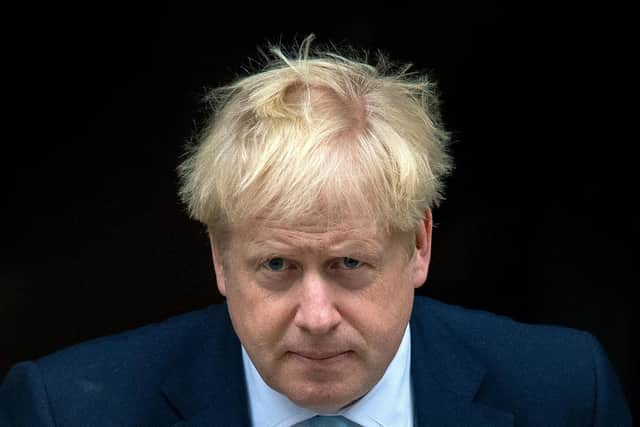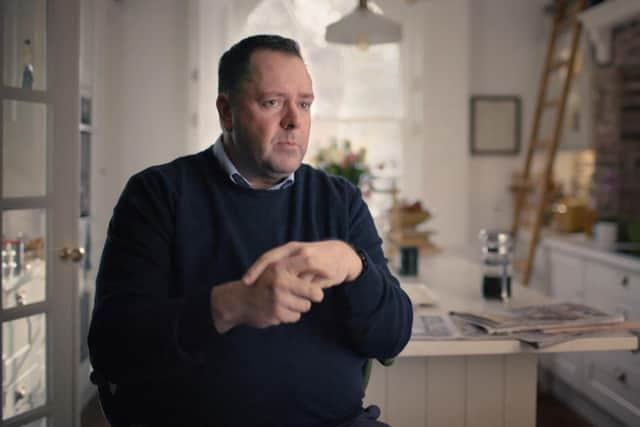The Rise and Fall of Boris Johnson review: A remarkably indiscreet documentary that puts the boot into Boris Johnson
and live on Freeview channel 276
Johnson is “one of those people who makes you laugh, while at the same time he's sticking the boot in”, Duncan Smith said. Also a pretty accurate summation of what the blond, blustering Old Etonian did to the country.
The first two parts of this documentary series have so far shown us the rise of ‘Brand Boris’, a tale of privilege, networking and a seemingly blithe belief that he was meant to become someone powerful.
Advertisement
Hide AdAdvertisement
Hide AdA tale in which sackings, back-stabbings and bed-hoppings make barely a dent in Johnson’s progress to the halls of power.


Aided by a media only too keen to be taken in by his bumbling, toff with a touch of the common man persona, the documentary shows how Johnson's dissembling came to him from an early age.
Virtually deaf until the age of eight, Johnson is shown confessing he “had to feign a certain ignorance of everything”, a trait which seems to have stood him in good stead.
By the end of the first two episodes, in fact, you can’t help feeling the Johnson feigns pretty much everything in life. He feigns fidelity, loyalty, commitment to a cause, all in service of his own career – a career The Rise and Fall... suggests has happened almost by accident.
Advertisement
Hide AdAdvertisement
Hide AdAccording to the many insiders interviewed here – as well as Duncan Smith, there's his former mistress Petronella Wyatt, family friends, his closest advisors and political adversaries – he doesn't seem to have expected anything.


On winning his seat in Henley in 2001, he remained editor of The Spectator, despite have told his constituency party that he would resign if he won – a classic case of hedging his bets.
According to adviser Will Walden, Johnson never expected to win the London mayoral election in 2008, when he beat Ken Livingstone.
He remained mayor even while fighting for, and winning, the seat of Hillingdon and Uxbridge in the general election of 2015 – despite saying he wouldn't return to the Commons while he was mayor.
Advertisement
Hide AdAdvertisement
Hide AdHe joined the Vote Leave campaign and then, when they won the Brexit vote in 2016, seemed totally non-plussed.


Walden says: “In Boris's mind there was sort of ‘what’s the plan? We haven't got a plan’. He never expected to win.”
But there is a counter-argument here too, that this happenstance, wasn't so coincidental, but a result of people constantly under-estimating the type of person Johnson is; that by putting on the affable, bumbling, Latin-quoting 'Boris' persona it allows to move untouched through the world, irrespective of the damage he does.
It's a remarkably indiscreet watch. Wyatt tells us how she became entranced by the 'Boris' character when they worked together at the Spectator.
Advertisement
Hide AdAdvertisement
Hide Ad“Boris was an actor. The ‘Boris’ was just an act,” she tells us.
Meanwhile, one adviser on Johnson's mayoral campaign tells how his candidate had a 'bird phone' on which his paramours would call him, while he also had a back door to his office at City Hall, through which he could sneak people without them needing to go past the gatekeepers at the front door.
It all comes back to his unhappy childhood, they say. The deafness, his father constantly moving them about as he flitted from job to job in European and UK politics, marital strife and his mother's mental health problems.
He felt unloved, poor mite. Wyatt says: “He was trying to compensate for a lack of love, or a feeling that he was unwanted, and so he wanted the whole world to live him to compensate.”
Advertisement
Hide AdAdvertisement
Hide AdBut a lot of people, unfortunately, have trauma and loss in their childhoods and they don't lie and cheat, seemingly in reflex.
The interviewers clearly provided the rope here, and the interviewees hang Johnson with it, but by the end of part two, there has been so much evidence of Johnson's mendaciousness that you can't be sure what about him is true.
Is he a ruthlessly ambitious political climber, a bumbling chancer, or a Zelig-like figure who just happens to be at the business end of UK politics?
You just keep coming back to Duncan Smith, and the image of Johnson laughing while he sticks the boot in – on his friends, on us, on the country.